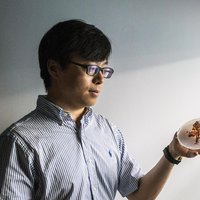Nanotechnology & materials
Grzegorz Wróblewski
Converts any surface into an electrode thanks to his transparent and flexible carbon nanotube coating

Global
Yihui Zhang
Pop-up nanostructures make it far easier to fabricate very tiny shapes.

Europe
Timothée Boitouzet
Translucent wood: a resistant and sustainable material for constructing the buildings of the future

Asia Pacific
Madhu Bhaskaran
Transparent Wearable Devices

Asia Pacific
Javier Gomez Fernandez
Shrilk and Bioinspired Materials: The Future of Sustainable Manufacturing
